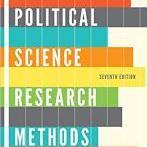-
Posts
5 -
Joined
-
Last visited
Reputation Activity
-
 polyscinoob reacted to GopherGrad in Some Words of Caution
polyscinoob reacted to GopherGrad in Some Words of Caution
Good clarifying question.
Uncertainty looms large in making these predictions, and the academic and private job markets are structurally very different. Given that many people's list of preferred jobs at some point starts to mix academic and non, it can be difficult to talk about this stuff concretely.
I would be surprised to find that a student at a Top 10/12/16/ish school who did the work and the networking failed to find some decent, challenging job that pays for a middle class life in a major American city of the student's choice. Graduates who end up permanently on the VAP circuit (or the private market equivalent) from these schools either have very specific and inflexible job preferences or did something fixably wrong to end up there.
As one moves down the school ranking and down the informal ranking of students at one's own school, the likelihood that this job will be academic decreases, and the attention the student should pay to the networking section of my advice (and to developing skills needed in the government and private sectors) increases.* Pick-your-place has a lot to do with the place's opportunities, but some trade-off between prestige or ideal job duties will usually open something up.
In general, if you have a sense of where you'd like to live and this consideration is more important than finding a prestigious or even academic job, networking in that place is totally key.
*Academia is not everyone's brass ring. Outside the obvious schools, if you prefer to work in a think-tank or NGO, networking becomes increasingly important, because there is a lot lower signal-to-noise ratio in private job markets, and fewer people will automatically know that UCLA or Duke is actually a pretty kick-ass department.
-
 polyscinoob reacted to Nozistin in Some Words of Caution
polyscinoob reacted to Nozistin in Some Words of Caution
I feel that if you learn to generally code, you can learn a new language without too much difficulty. There are boutique boot camps that can teach new languages in 1-3 months in pretty good depth. In California, even community colleges teach C++. Maybe I'm also on the optimistic boat but I think that if you can gain the rigorous quantitative, methodological and theoretical background that a lot of top 15 programs offer along with the basic coding skills in R, STATA, SQL, and sometimes a bit of Python, you are 90% of the way to being a competitive data scientist in industry. But again, I might just be looking at it with the eyes of someone who wants to do a PhD and not feel like I'm risking so much.
-
 polyscinoob reacted to resDQ in Some Words of Caution
polyscinoob reacted to resDQ in Some Words of Caution
This. BUT I would not rule it out as a possibility.
With all of the computer science types taking jobs in California, you would have to be open to living in a different state if things do not work out. And I do not think it will be any easier to get than a TT job at a LAC. You would probably have to take a job that you are overqualified for (if your qualifications don't scare people off) then move your way up. Think tanks that require quant skills is an easier option. That said, people do get hired at Facebook and such (look at Stanford placement).
No one here knows the answer. Get your training and keep your fingers crossed that you get a job.
-
 polyscinoob reacted to guest56436 in How are the political science programs at UC Santa Cruz and Penn State
polyscinoob reacted to guest56436 in How are the political science programs at UC Santa Cruz and Penn State
I'm sorry, but this is a crock of shit. Completely false.
-
 polyscinoob got a reaction from terefere in What are examples of PhD programs that have declined in quality/prestige in recent years?
polyscinoob got a reaction from terefere in What are examples of PhD programs that have declined in quality/prestige in recent years?
I think the ranking stuff is pretty fascinating,
Top 10 positive changes in rank vs score
University 2013 Score 2013 Rank 2017 Score 2017 Rank Score Differential Rank Differential University of Pennsylvania 3.3 28 3.8 19 0.5 9 University of Houston 2.3 68 2.7 51 0.4 17 University of Oklahoma 2.1 83 2.5 61 0.4 22 Vanderbilt University 3.1 36 3.5 24 0.4 12 University of California—Davis 3.5 23 3.9 17 0.4 6 University of California—Riverside 2.5 54 2.9 48 0.4 6 American University 2.3 68 2.6 56 0.3 12 University of Massachusetts—Amherst 2.3 68 2.6 56 0.3 12 Georgetown University 3 40 3.3 33 0.3 7 Duke University 4.2 10 4.5 7 0.3 3 -----
University 2013 Score 2013 Rank 2017 Score 2017 Rank Score Differential Rank Differential University of Oklahoma 2.1 83 2.5 61 0.4 22 University of Houston 2.3 68 2.7 51 0.4 17 Vanderbilt University 3.1 36 3.5 24 0.4 12 American University 2.3 68 2.6 56 0.3 12 University of Massachusetts—Amherst 2.3 68 2.6 56 0.3 12 Temple University 2.2 76 2.4 65 0.2 11 University at Buffalo—SUNY 2.2 76 2.4 65 0.2 11 University of Connecticut 2.2 76 2.4 65 0.2 11 Georgia State University 2.1 83 2.3 72 0.2 11 University of Pennsylvania 3.3 28 3.8 19 0.5 9
If anyone is interested, you're more than welcome to the data set.
USNews_rankings_dataset.xlsx
-
 polyscinoob got a reaction from oakeshott in What are examples of PhD programs that have declined in quality/prestige in recent years?
polyscinoob got a reaction from oakeshott in What are examples of PhD programs that have declined in quality/prestige in recent years?
I think the ranking stuff is pretty fascinating,
Top 10 positive changes in rank vs score
University 2013 Score 2013 Rank 2017 Score 2017 Rank Score Differential Rank Differential University of Pennsylvania 3.3 28 3.8 19 0.5 9 University of Houston 2.3 68 2.7 51 0.4 17 University of Oklahoma 2.1 83 2.5 61 0.4 22 Vanderbilt University 3.1 36 3.5 24 0.4 12 University of California—Davis 3.5 23 3.9 17 0.4 6 University of California—Riverside 2.5 54 2.9 48 0.4 6 American University 2.3 68 2.6 56 0.3 12 University of Massachusetts—Amherst 2.3 68 2.6 56 0.3 12 Georgetown University 3 40 3.3 33 0.3 7 Duke University 4.2 10 4.5 7 0.3 3 -----
University 2013 Score 2013 Rank 2017 Score 2017 Rank Score Differential Rank Differential University of Oklahoma 2.1 83 2.5 61 0.4 22 University of Houston 2.3 68 2.7 51 0.4 17 Vanderbilt University 3.1 36 3.5 24 0.4 12 American University 2.3 68 2.6 56 0.3 12 University of Massachusetts—Amherst 2.3 68 2.6 56 0.3 12 Temple University 2.2 76 2.4 65 0.2 11 University at Buffalo—SUNY 2.2 76 2.4 65 0.2 11 University of Connecticut 2.2 76 2.4 65 0.2 11 Georgia State University 2.1 83 2.3 72 0.2 11 University of Pennsylvania 3.3 28 3.8 19 0.5 9
If anyone is interested, you're more than welcome to the data set.
USNews_rankings_dataset.xlsx
-
 polyscinoob reacted to Determinedandnervous in Some Words of Caution
polyscinoob reacted to Determinedandnervous in Some Words of Caution
It's quite possible. You do need to learn more programming languages than the average political scientist (python, sql and c++ come to mind), and you do want to cultivate a professional network. It is certainly not a bad situation to be in if you have the skills to do it though - not many fallbacks make six figures.
-
 polyscinoob reacted to curvilineardisparity in Faculty perspectives
polyscinoob reacted to curvilineardisparity in Faculty perspectives
Dear professors,
Thank you very, very much for all your posts here! They are extremely helpful!
I was accepted by two different universities. A high ranked one, which offered 5 years of funding, including two years of either TA or RA (second and third years), and the rest without any work obligations; and a low ranked one, which offered a renewable 1-year TA, 4 years of summer TA and an additional scholarship from the department. Both universities have at least one professor that I'd love to work with, and in both I'd earn fairly the same amount (the second one pays a little more).
Whereas I'm very tempted to take the first offer, I really want to do a TA for as long as possible. I've been a lecturer before in my home country, and I believe that being a TA for longer increases my chances of being hired at a university afterwards.
My questions are:
1) Is it true that being a TA increases one's chance of being hired after graduation?
2) Taking into consideration the first case, do you see any chance of becoming a TA, let's say, in the first year, during summer courses, after the third year, etc, other than the two assigned years?
3) In case the answer to (1) is yes, does it make sense to prioritize the university with a lower rank that offered me more possibilities of being a TA?
-
 polyscinoob got a reaction from lalalalovesong in Welcome to the 2016-17 cycle!
polyscinoob got a reaction from lalalalovesong in Welcome to the 2016-17 cycle!
I imagine two things are at play (although, I'm new to the admissions thing so feel free to correct me).
1.) This forum (and the results page) are not a representative sample of all the people who apply to grad school. The shoe-in candidates who aren't worried about getting in probably don't check this forum or post, (and thus we would never know if they got admission early in January).
2.) The early bird gets the worm. Admissions committees outside of the top 15 want good candidates too, early offers = higher likely hood they get those candidates to sign on.
-
 polyscinoob reacted to meteora in Welcome to the 2016-17 cycle!
polyscinoob reacted to meteora in Welcome to the 2016-17 cycle!
UIUC tends to decide early. It looks that someone had an admission on January 7 last year. .
-
 polyscinoob got a reaction from dagnabbit in Welcome to the 2016-17 cycle!
polyscinoob got a reaction from dagnabbit in Welcome to the 2016-17 cycle!
Typo on the UCR one, haven't accepted it, but it's mine.



